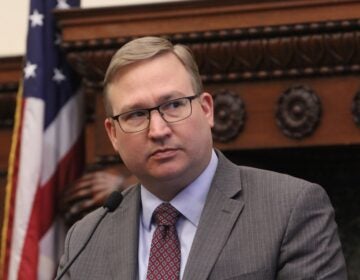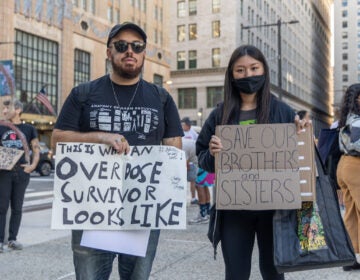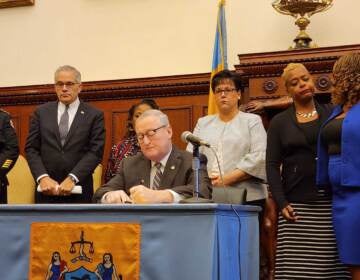‘We’re losing too many talented, bright people’: Philly’s next managing director vows to combat violence
Philadelphia’s incoming managing director Tumar Alexander says preventing violence is his top priority and brings more diplomatic style than Brian Abernathy.
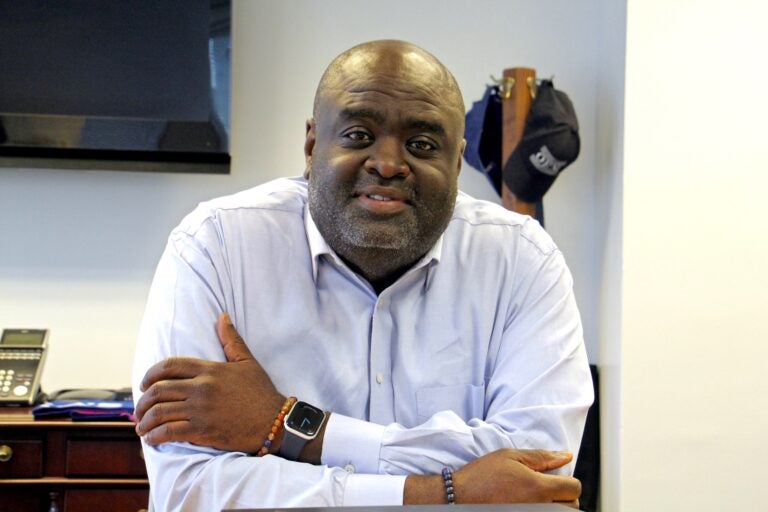
Philadelphia's First Deputy Managing Director Tumar Alexander. (Emma Lee/WHYY)
Tumar Alexander was at the scene of a shooting in West Philadelphia last year when a woman pulled him aside to say that she was a block captain, and she had a problem in her neighborhood: two blighted, vacant lots.
Alexander, the city’s first deputy managing director, took notes on his cell phone and told the woman he’d get crews out there to clean up the properties. It was an opportunity both to help the neighborhood, he says, and to show that the city is dedicated to providing services beyond police and ambulances responding to crime.
The city should be doing more of that kind of outreach, Alexander said. Even police officers could funnel service requests to other agencies, which could help build trust with residents and encourage them to cooperate with investigators who are trying to end this year’s surge of fatal shootings.
“I want to be able to prioritize those issues because that builds up the cooperation in the community with police folks, right?” Alexander said. “If they see that the cops are not only coming to address the crime concern, but also listening to them when they have quality-of-life issues and making it happen, that’s a win-win. If something happens on that block, there’s likelihood to be more cooperation for us to help solve some of these crimes and some of these issues.”
Alexander said community outreach and anti-violence work will be among his top priorities when his boss, managing director Brian Abernathy, departs next month and Alexander steps into the job on an acting basis. As the city’s top non-elected official, he’ll oversee a vast swath of departments, from police and prisons to Mural Arts and animal control, but the need to reduce violence in the city, he said, motivates him in particular.
“I absolutely, absolutely, want to make a difference in the whole issue of violence prevention. We’re losing too many talented, bright people that won’t have a future because of gun violence.” Alexander said. ”However long I’m in this role, whatever role it may be, I want to make sure I make a difference on that. It just so happens that’s one of the mayor’s priorities.”
Other changes could also be coming to the managing director’s office, which has been the target of angry protests in recent months. Activists blame Abernathy for the police tear-gassing of Black Lives Matter protesters, for resisting demands to defund the police, and for cutting city spending on affordable housing, the arts, and other programs.
Mayor Jim Kenney is considering possible structural changes to the position, which is unusual for the power it holds compared to equivalent jobs in other cities. The mayor will “look critically at the present structure to determine if it is working well, if the portfolio is too large, or if some functions could be realigned in different ways,” spokesperson Deana Gamble said in an email.
“The mayor always envisioned a strong MDO [Managing Director’s Office] and overall he still favors this structure. But the MDO leadership transition affords him the opportunity to see how a reorganization can better advance his renewed priorities of police reform, violence reduction, racial equity, education, and inclusive economic recovery,” she said.
Abernathy and Alexander both say their job is to implement Kenney’s vision, not to carry out one of their own. But Alexander is expected to subtly change the office’s relationship to City Council and the public, bringing a more diplomatic, behind-the-scenes style to the position. That would represent a change from the often frank and forthright Abernathy, who became unusually visible for a managing director this year, due in part to his daily appearances on live-streamed COVID-19 press conferences.
Alexander “really gets people and relationships, and so he’s always kind of thinking about who he’s talking to, what their interests are, what will make this interaction successful from their point and view,” said Eva Gladstein, the Deputy Managing Director of Health and Human Services, who has known Alexander for several years. “That’s a really great skill to have.”
‘Help me save my son’
On a recent Thursday morning, Abernathy and Alexander joined a series of virtual meetings on a typically wide range of topics: a loose barge that hit a bridge on the Schuylkill River, flooding in Eastwick and Manayunk, a few potential affordable housing projects, the Free Library director hiring process, homeless encampment negotiations, an effort to mitigate Kensington’s opioid crisis, and trash pickup delays.
They worked from Abernathy’s corner office on the 14th floor of the Municipal Services Building, which was quiet and nearly empty due to COVID-19. They participated in discussions of the city’s precarious finances, the Rebuild program to renovate parks and libraries, diversity and inclusion initiatives, digital access for school children, and juvenile justice programs, among others, before strolling over to Reading Terminal to grab lunch.
Several of the meetings were tinged with a sense of urgency over this year’s 30% spike in shootings and public frustration at the city’s inability to stem the violence. A few days later, 150 people would gather in front of City Hall to rail against gun violence. City Council followed up with a hearing where members wondered aloud why the city’s 3-year-old Office of Violence Prevention — a unit within the managing director’s public safety cabinet — was not showing signs of progress.
Abernathy, Alexander, and two other staffers met virtually with Vanessa Garrett Harley, Deputy Managing Director for Criminal Justice and Public Safety. They discussed the city’s newly launched Group Violence Intervention, or GVI, program that her department just kicked off in West Philadelphia.
“I’m assuming everybody knows we had a 7-year-old murdered last week. A 6-year-old was shot last night. So we’re still having tremendous challenges around violence,” Abernathy said. “We soft-launched GVI. How’s the first week going?”
GVI is an expanded version of a Focused Deterrence program piloted in 2013 by the Nutter administration, where Alexander served as the deputy chief of staff. People involved in shootings as perpetrators or victims are called in to meet with police, prosecutors, state and federal officials, social service workers, and anti-violence activists, who try to pressure or coax them into accepting help and choosing a different path. Major drops in youth crime have been attributed to GVI in other cities.
The COVID-19 pandemic forced Philadelphia’s program to start off with labor-intensive home visits, or “custom notifications,” rather than large joint call-ins, but Harley said she was still optimistic.
“One guy was like, look, ‘I’m ready to get out. Truthfully. I’m ready to stop’ — but almost like he didn’t know how. He had just recently seen his best friend, and I think another relative killed,” Harley said, her voice emerging tinny from Abernathy’s laptop.
At a second home the GVI team visited, the man they were looking for wasn’t home but his mother was, she said. “While it was met with hostility in the beginning when the team came — ‘Who are you, what do you want, you brought police with you to my door’ — by the end of the meeting the woman was crying and amenable and basically saying, ‘Help me save my son,’” she said.
“We’re doing it, and it’s difficult, but we can’t wait for COVID. As you see, the shooting numbers keep increasing,” Harley said.
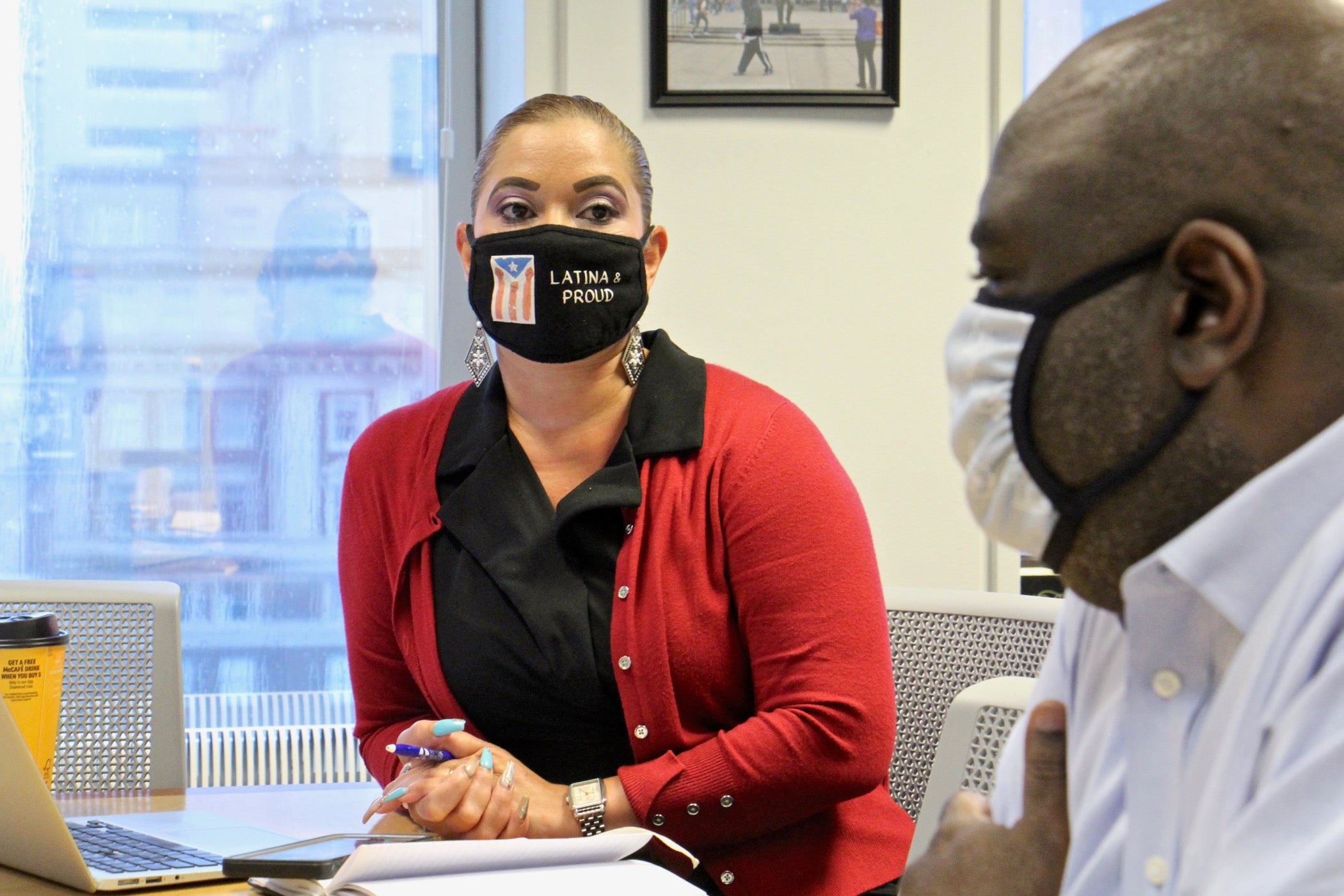
Managing director job may change
As the head of city operations, the managing director oversees a huge portfolio: 30 departments and offices with a combined $4.7 billion budget and more than 20,000 employees. Abernathy says he has “loved serving the city,” but the job became so wearing that he agreed with Kenney that now would be an appropriate time for him to resign.
People close to Kenney had urged the mayor to find a new managing director after Abernathy became a prominent magnet for criticism, the Inquirer reported. But Abernathy was adamant that he’s not quitting because of the complaints themselves, which he says come with the job and are often unjustified.

He said he has essentially been doing the job for five and a half years, since he became first deputy managing director under Mike DeBerardinis, who delegated many duties. When he succeeded DeBerardinis, he’d only intended to stay for two to three years anyway, he said. The layered crises of the last five months deepened years of accumulated emotional exhaustion and hastened his exit.
“I’ve been at crime scenes where I’ve seen a 2-year-old’s brain splattered on a [expletive] door, and that stuff, it wears on you and it keeps you up at night,” Abernathy said.
“And when you manage through a pandemic, when you literally feel like you have people’s lives in your hands, when you’re trying to make sure your hospital stays open, when you’re trying to figure out how you’re going to recover economically, knowing that every decision you make has a ripple effect on thousands of people… And then you end up in an economic crisis where I have to lay off people I’ve known literally my entire career,” he said.
He agreed it could be reasonably argued that the job covers too many different responsibilities.
“You have 80 to 90 percent of the government operations here, so there’s some criticism there. I’ve taken criticism for a host of things. And I think that’s fair. The managing director’s office does have a tremendous amount of power, and I think there’s some debate about whether that power should be diffused,” Abernathy said. “It’s also a lot for one person to do.”
He and other city staffers say they don’t know how the office will change. But precedents from prior administrations and Kenney’s own tenure suggest the mayor could remove some departments that he particularly cares about from the managing director’s office and give them to another top-level appointee.
Gamble noted that the administration already restructured in January, creating an Office of Children and Families that reports directly to the mayor. It consolidates youth-related programs, including the Department of Human Services and several school district- and education-related programs.
The new office is headed by Cynthia Figueroa, who was promoted to deputy mayor after previously serving as Human Services Director under Abernathy. The move recalls Mayor Michael Nutter’s strategy of vesting authority in deputy mayors rather than his managing director, who served as more of an administrator. Kenney also has deputy mayors for labor and intergovernmental affairs.
Education and youth services have been top priorities for Kenney since he was elected, and he could potentially further expand Figueroa’s portfolio by giving her more related departments that the managing director currently oversees, such as Parks and Recreation and the Free Library.
An uncertain transition
Activists who blame Abernathy for harsh police tactics during this summer’s protests welcomed his resignation. Some say they’re cautiously optimistic that real reform is more likely under Alexander.
Abernathy has been seen as a defender of the police. He argued for continued use of controversial stop-and-frisk tactics and more funding for the department. When he announced he was leaving, a source close to the mayor said the administration did not have confidence in Abernathy to execute a police reform agenda, suggesting Alexander may be expected to shepherd through deeper changes.
“The managing director holds a lot of responsibility as it relates to funding, as it relates to the police, so we thought it makes sense for there to be a change there for someone who was more in lockstep with the will of the people,” said Rev. Nicolas O’Rourke, a former City Council candidate and director of organizing for the Pennsylvania Working Families Party.
“It’s worth noting that the mayor has brought in a Black male to take that role,” O’Rourke added, referring to Alexander. “Representation is good, representation is important, for sure. Alongside that, we want action as well.”
But others say they’re not sure whether the transition will make any difference.
A group called Artists Against Abernathy said they were glad Abernathy is leaving because he was “instrumental in the systemic oppression of Black and brown communities and their cultural identity for years.” But organizer Rachel O’Hanlon-Rodriguez said Kenney now seems to be pursuing another opaque promotion of an internal candidate little known to the public, as he did when he appointed Abernathy to the job.
“What I’m worried about is that they’re won’t be any significant change if Tumar Alexander is just moving up a rank into this position. Does he have the skills needed for a managing director? I would love to understand why he is the right person,” she said.
Rodriguez said she researched managing directors in other cities and found that generally either their appointment requires legislative approval, which increases their accountability to voters, or they have less power than Philadelphia’s managing director. She called for much greater public involvement in the selection of Abernathy’s permanent successor.
“If that managing director has that much decision-making power, then he shouldn’t be beholden just to the mayor,” she said. “That’s not great ethics, it’s not accountability, it’s not transparency, and it makes me concerned with how the city is being run and where the priorities all lie.”

Subscribe to PlanPhilly
WHYY is your source for fact-based, in-depth journalism and information. As a nonprofit organization, we rely on financial support from readers like you. Please give today.





